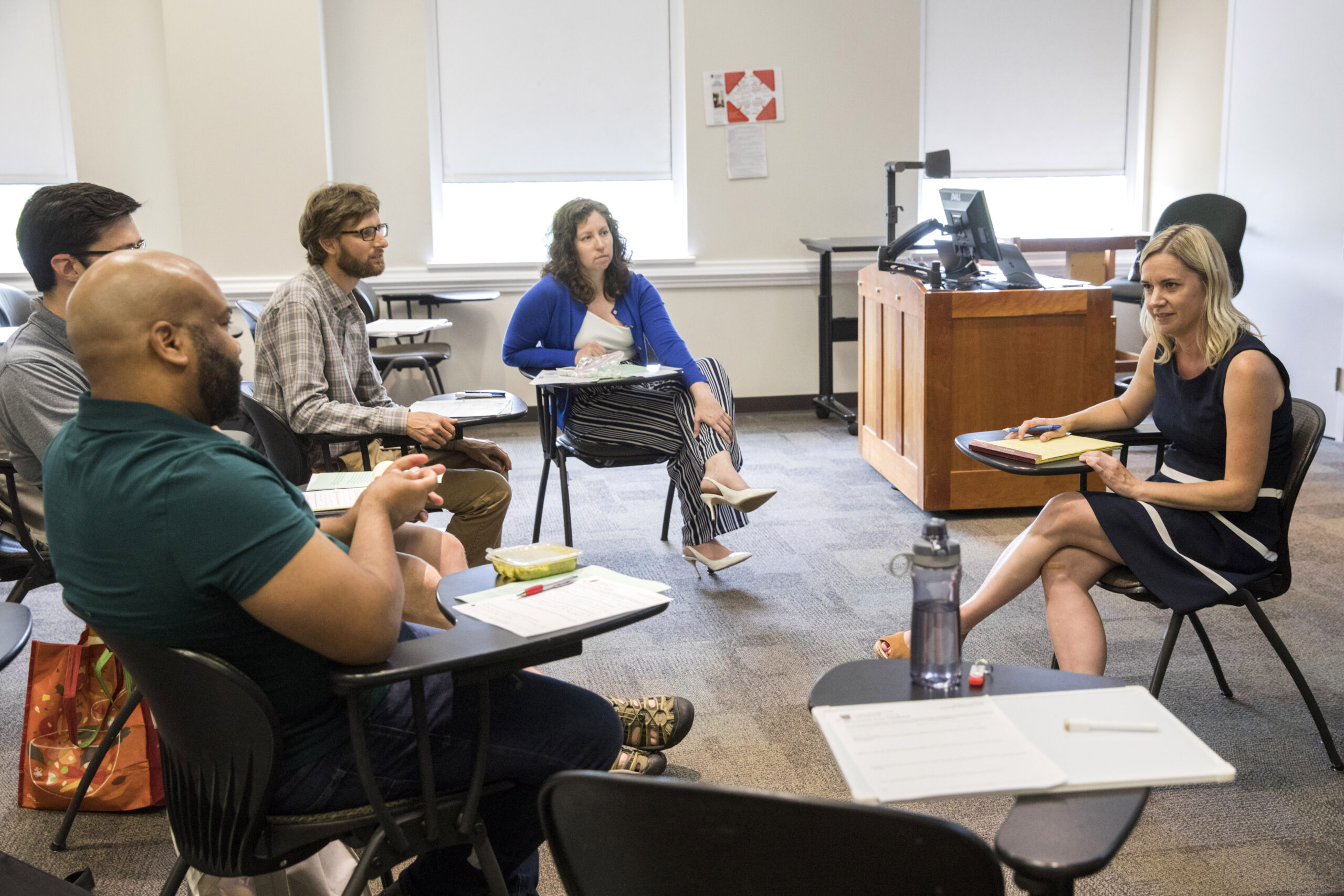
The University of Georgia is working to promote student success by removing barriers to learning in the classroom. This fall, the Center for Teaching and Learning launched a workshop focused on building community in the classroom.
This fall, 22 faculty members across nine schools and colleges joined the first “Students at the Center of Our Teaching” workshop. The two-day intensive workshop covered topics on understanding today’s students, engaging and building relationships with students in a comfortable learning space, and analyzing how course policies and assessment choices have an impact on students’ learning.
“I was interested in participating in this workshop because I recognized that my background and my own experience while attending college may be very different from those of my current students,” said Alison Morrison, clinical associate professor with the Department of Communication Sciences and Special Education in the Mary Frances Early College of Education. “I wanted to better understand how I could remove unintended barriers or challenges from my courses to help set students up for success.
The Center for Teaching and Learning began developing this workshop last spring with support from the Office of Instruction and the goal of enhancing student-centered teaching across the university. Ruth Poproski, the CTL’s associate director for teaching and learning, said student-centered teaching focuses on creating an environment in which students experience a sense of belonging, and focusing on the skills and experiences they bring with them to the learning environment. This approach can lead to increased learning gains for all students, and especially so for our first-generation, rural, and transfer students.
“This is also complementary to active learning,” Poproski said. “With active learning, when students are more comfortable, they are more able to focus on learning. And if there is ever resistance to active learning, it is easy to overcome by building that relationship with students.”
Participants spent time understanding what students bring with them to the classroom, examining the instructor’s role for engaging students in their own learning, analyzing their own syllabuses to see whether they have created boundaries for students, and how their assessment choices and flexibility around assessment affects intended learning outcomes. The cohort also spent time reviewing research on the improved academic and curricular success in classrooms with strong communities.
“In ‘Students at the Center of our Teaching,’ our dedicated faculty members have exemplified a sincere commitment to the transformative power of learner-centered teaching strategies,” said Meg Mittelstadt, director of the Center for Teaching and Learning. “Their enthusiasm for exploring and implementing these strategies is truly commendable. We extend our heartfelt appreciation to the Office of Instruction for their support in making this initiative a resounding success.”
Feedback from faculty has been excellent. Many participants said that they gained inspiration and fresh ideas from working with their peers during the workshop, and they appreciated the incorporation of peer-review strategies as well.
The Center for Teaching & Learning hopes to be able to offer the Students at the Center of our Teaching series again next year, with adjusted themes to ensure that both repeat and new participants can continue to enjoy the experience.
“I really appreciate the opportunities for ongoing growth and development,” said Bryan Barber, lecturer of International Affairs with the School of Public and International Affairs. “With advances in technology, such as AI and online learning, we are obligated to improve the classroom experience for our students to something that is not replicable elsewhere. These workshops are essential in doing so.”
The 2023 Participants:
- Sarangan Balasubramaniam, lecturer with the Department of Statistics in the Franklin College of Arts and Sciences
- Bryan Barber, lecturer of International Affairs with the School of Public and International Affairs
- Sara Blankenship, lecturer with the Department of Chemistry in the Franklin College of Arts and Sciences
- Nick Chiles, writer in residence with the Grady College of Journalism and Mass Communication
- Suzanne Ellenberger, director of general chemistry with the Department of Chemistry in the Franklin College of Arts and Sciences
- Kimberly Grantham, principal lecturer with the Department of Marketing in the Terry College of Business
- Jessica Jensen, lecturer with the Department of Chemistry in the Franklin College of Arts and Sciences
- Jessica Kissinger, distinguished research professor with the Department of Genetics in the Franklin College of Arts and Sciences
- Melissa Landers-Potts, senior lecturer with the Department of Human Development and Family Science in the College of Family and Consumer Sciences
- Brita Lorentzen, assistant professor with the Department of Anthropology in the Franklin College of Arts and Sciences
- Alison Morrison, clinical associate professor with the Department of Communication Sciences and Special Education in the Mary Frances Early College of Education
- Daphne Norton, general chemistry lab coordinator with the Department of Chemistry in the Franklin College of Arts and Sciences
- Crystal Robinson, lecturer with the Department of Cellular Biology in the Franklin College of Arts and Sciences
- Jorge I. Rodriguez, industry capstone projects coordinator in Environmental, Civil, Agricultural & Mechanical Engineering with the College of Engineering
- Roberto Ruiz with the Department Health Policy & Management in the College of Public Health
- Valerie Ryman, assistant professor with the Department of Animal & Dairy Science in the College of Agriculture and Environmental Sciences
- Siddharth Savadatti, senior lecturer in Environmental, Civil, Agricultural & Mechanical Engineering in the College of Engineering
- Catherine Simpson, principal lecturer with the Department of Romance Languages in the Franklin College of Arts and Sciences
- Erin Towery, associate professor with the School of Accounting in the Terry College of Business
- Martin Ward, lecturer with the Department of Romance Languages in the Franklin College of Arts and Sciences
- Stephanie Whitten, clinical assistant professor with the Department of Human Development and Family Science in the College of Family and Consumer Sciences
- Qichen Zhao with the Department of Psychology in the Franklin College of Arts and Sciences
